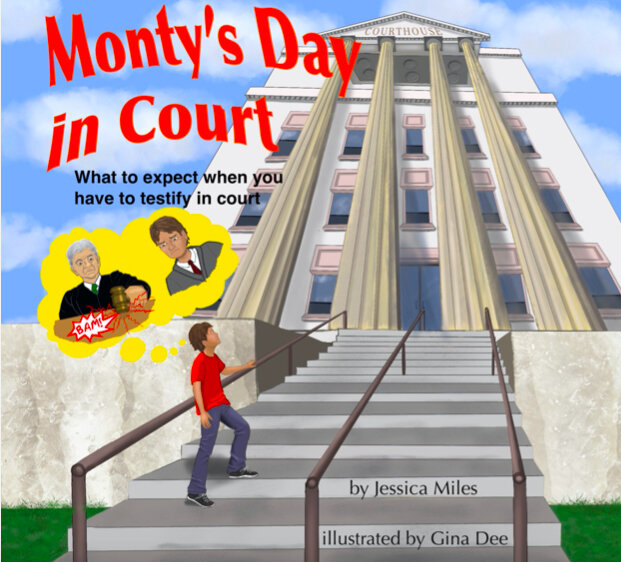Helping children from hard places
If you’re reading this blog, chances are that you are either parenting a child from a hard place or know such a child in some other way. Sadly, coming from a hard place can mean being the victim of a crime. It may even mean that the child has to testify against those who hurt them, which could inflict additional trauma on the child.
Thankfully, there are supports in place such as foster families, social workers, therapists, CASAs, Kids and Teens in Court, and Bikers Against Child Abuse (B.A.C.A.). Still, children may not know exactly what to expect. Monty’s Day in Court can help walk them through.
Monty’s Day in Court
The story is written by Jessica Miles and illustrated by Gina Dee. Miles is an in-the-trenches parent whose child had to testify against his biological father. According to the story’s Foreword, this is not her son’s actual story. Still, many of the emotional truths remain the same.
The book opens with Monty briefly talking about the abuse. Few details are provided, which both helps avoid triggering trauma in the reader and makes the book more widely applicable to a variety of situations. It goes on to describe the arrest, therapy sessions, and each step of the legal process, including an illustrated description of the different people who will be in the courtroom. In this particular story, the trial ends with a conviction and prison time.
My thoughts
What I appreciate most about Monty’s Day in Court is that it addresses not just events and procedures, but also the confusing array of emotions a child might feel: anger, fear, guilt, relief, to name a few. My only real questions were the following:
- I couldn’t readily tell what age group this book was geared toward.
- B.A.C.A. –to whom the book’s proceeds will be donated–is not necessarily a standard part of every child abuse case.
Both of these are easily addressed. I highly doubt–and certainly would not recommend!–that children will simply read this book and figure things out on their own. They would surely be reading it with a parent, a therapist, or some kind of an advocate such as a Court Appointed Special Advocate (CASA) or Guardian Ad Litem (GAL), someone who would be able to explain things in terms that make sense for that child’s specific situation. In fact, the Discussion Guide on the book’s companion website gives several examples of things that might change from one situation to the next.
This same part of the website also specifically addresses my other question:
“The B.A.C.A. organization is not always able to intervene and assist. It may have to do with location, availability and any number of other legal or logistical requirements. It does not have anything to do with the ‘worthiness’ of a child.”
The trusted adult reading the book with the child could talk about not just B.A.C.A, but also other groups who look out for children and make sure they feel safe.
A much-needed resource
Monty’s Day in Court is also available in Spanish in a very straightforward translation. This is most welcome, as resources for Hispanic and Latinx populations are sometimes hard to come by. Again, one supposes an adult would be reading this with the child and would be able to address specific cultural issues as well as the role of translators, if required, in the process.
All in all, Monty’s Day in Court is a wonderful addition to the toolbox for combatting childhood trauma and helping its survivors heal. Whether you’re a CASA, social worker, therapist, parent, or simply have a heart for kids, I encourage you to check it out.



